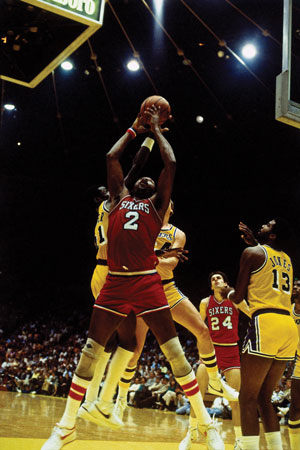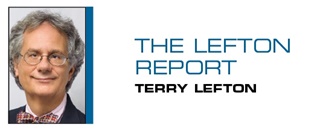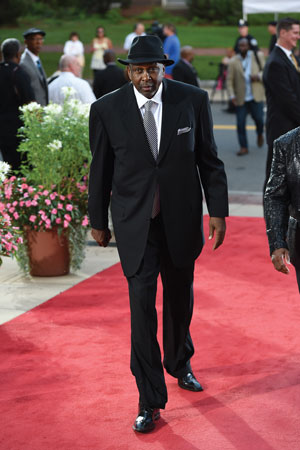A
s the reminiscences and eulogies for basketball hall of famer
Moses Malone poured in last week, two themes emerged. One was how underappreciated Malone was, even with three MVP awards, 13 All-Star Game appearances and an NBA title for the “fo’-fi’-fo’” Philadelphia 76ers in 1983.
Some of that underappreciation was attributable to Malone’s character: He was a larger-than-life guy with a reticent persona. Fellow hall of famer Dominique Wilkins was the “Human Highlight Reel.” Malone was the antithesis, a blue-collar laborer among the NBA’s white-collar aerialists, toiling in the paint, performing the thankless but most essential of tasks on a basketball court: securing a rebound. Malone’s “highlight reel” would include boxing out, staunch defense and sinking free throw after throw.
 |
Malone doing the dirty work in the 1983 NBA Finals, and (below) at this month’s Hall of Fame ceremony
Photos by: NBAE / GETTY IMAGES (2)
|
Having trumpeted Malone’s achievements on the hardwood, we’re here to make the case that off the court, his legacy is more profound. The success rate of high school players making the transition from preps to the NBA is not high, but Malone is the poster child for that group. He was the first to make that jump in 1974, ignoring a letter of intent he had signed with the University of Maryland to join the ABA’s Utah Stars.
“Very few people can appreciate how revolutionary the concept of a high school player going directly to the pros was 30 years ago,” said Phil de Picciotto, a co-founder of Advantage International, the agency that represented Malone from his teen years through his lifetime.
So how’d that high-school-to-pro transition work out? Let’s define that in off-court terms. Malone eventually became the NBA’s first million-dollar-a-year player; later he was the league’s first $2-million-a-year player, and then the first to earn a $3 million annual NBA salary. For that alone, every NBA player should have considered attending Malone’s funeral.
With his deep, bass voice and deliberate speaking cadence, Malone was not the easiest person to understand, nor was he a simple sell to marketers. Still, the men who put those deals together for the likes of
Nike,
Pepsi,
MacGregor and
Fuji Film have memories of him refusing to leave paid appearances until everyone had an autograph. “He’d always tell us, ‘I know what I don’t know and that’s why I need help from you guys,’” said
Gary Stevenson, vice president of marketing at Advantage from 1983 to ’97 and now president and managing director of business ventures at MLS. “That was and is very unusual for a pro athlete to take that position.”
In the locker room, Malone never said much, but as a young reporter we learned to pay attention to what he did say — witness “fo’-fo’-fo,’” his prediction for how the Sixers would do in the ’83 playoffs, meaning three straight four-game sweeps. A bit earlier during a season when the Sixers won 65 of 82 games, Malone was asked if the team could possibly play any better. “I just hope our balls don’t break if we play any better,” Malone replied. Everyone, including Dr. J, laughed at that response.
Malone helped grow what became one of the industry’s largest and most influential sports marketing agencies in Advantage, which later became Octagon. Advantage was born out of a fissure between ProServ partners in April 1983. Less than two months later, the Sixers won the NBA championship and Malone was the regular-season and playoff MVP. He was the first NBA client of note for Advantage and helped it transition from a tennis agency to a more broad-based shop, representing athletes across sports.
“Without Moses Malone, we don’t grow as much as we did and have, it’s as simple as that,’’ said Lee Fentress, an Advantage founder and Malone’s longtime agent. “He was the founder of our basketball business.”
Subsequently, Malone became Advantage’s calling card.
“When we were starting out and someone asked you who you represented, Moses Malone was the first or second name out of my mouth,” said Tom George, the first new employee hired by Advantage, who worked there and at Octagon for more than 20 years. “We ended up competing for the best basketball players coming out of college because Moses gave us the credibility to do that.”
The notion of Malone as a cornerstone is one you hear across Octagon.
“Moses was the beginning and foundation of our basketball group,” said Frank Zecca, managing director of Octagon Financial Services, who has handled Malone’s finances for the past 22 years. “He was the building block for all the guys we handle today, whether it’s Chris Paul or Steph Curry. Handling Moses for so long helped us define our offerings and ourselves.”
Advantage/Octagon had worked with Malone since his high school years, from helping him unwind the University of Maryland letter of intent to handling his contracts and finances, and now his estate. “Moses was our client for 42 years,” said de Picciotto, now Octagon’s president. “Those are the kinds of clients that make an agency viable. He helped us solidify and determine what we stand for.”
Terry Lefton can be reached at tlefton@sportsbusinessjournal.com.






